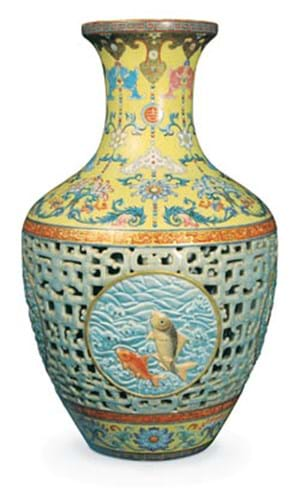
He is reported in the Uxbridge Gazette as saying that "the buyer is completely legitimate, with no ulterior motives. The sale is going through and is completely within the time-frame we are comfortable with".
Bainbridge's efforts to keep the details of the transaction confidential had left both the trade and the press to speculate that November's fairytale sale of a Qianlong vase for £43m will not be consummated.
However, few clear facts have emerged over the last four months since auction history was made. And until any more definate information comes to light, we can only take Peter Bainbridge at his word that the gossip has it wrong.
Indeed, despite all the negative reports, the £43m fairytale could yet have a happy ending.
Firstly, there is no good reason to doubt the vase's authenticity.
It was universally declared 'right' by countless leading members of the UK trade before the sale, when the only talk was how much more than £18m (the previous record for Chinese porcelain) it would bring. If the £43m plus premium were never to be paid, the vendor, if not necessarily the auctioneer, is almost certainly guaranteed a windfall sometime in the near future.
And what about the speculation that the buyer will pull out?
The fact is that the prevalence of mainland Chinese buyers has necessitated increasing diligence from the UK auctioneers, who welcome their presence but fear the bogus transaction. There have been bad apples who have sought to exploit geographic, cultural and language barriers to their advantage or use the auction room as a cost-effective bank/storage unit in a rising market.
But while there have been examples of non-paying Chinese bidders before - not least the 'buyer' of two bronze animal heads from the Zodiac fountain at the Summer Palace sold at Christie's Yves Saint Laurent sale in 2009 who publically declared his intention not to pay - there are in fact genuine reasons why bidders from mainland China may take time to pay their bills.
The official currency of the People's Republic, the renminbi (RMB), remains a domestic rather than a global medium of exchange and moving large sums of money out of the country is not straightforward. While the international auction houses maintain they wait just seven days for payment, the reality is that several months is commonplace for major transactions.
The question remains, however, in the event of a sale not being completed, would a consignor have the right to withdraw the piece and sell elsewhere?
ATG's legal columnist, specialist art and auctions lawyer Milton Silverman, of law firm Streathers, tackled this point in relation to another case in his column in ATG No 1960, under the headline What happens when the buyer fails to pay?
His views bear repeating here:
"My sophisticated client [the consignor] was then astonished to hear that he did not have the right just to cancel the sale and pull the work from the auction house in order to sell elsewhere at his discretion. I had to explain - the way the major auction houses' terms and conditions are drafted is to seek to give them total control.
"The conditions applicable to the defaulting buyer, found in the auction catalogue, enable the auction house, if they so choose, for example, to charge interest to the buyer, commence legal proceedings to recover the purchase price, stop the buyer bidding in the future and, indeed, cancel the sale and re-sell elsewhere.
"Separately, in a different document, the sale agreement with the consignor will make clear that the auction house has, for example, 'absolute discretion' whether to take the various steps available, and outlined above, against the buyer.
"Readers will be consigning on the terms of the sale agreements all the time, but, like my experienced client, many may not appreciate the relationship between the sale terms which the consignor signs, and the terms applying to the buyer in the catalogue. Thus the auction house will, at least on paper, attempt to control both ends."
Whilst the exact terms and conditions of the vase's consignment to Bainbridge's have not been made public, the T&Cs published on the firm's website include the following section:
3 (a) Bainbridge's has absolute discretion without giving any reason whatever to refuse any bid, divide any lot, to combine any lots or withdraw any lot and in case of dispute to put up any lot for auction again.




